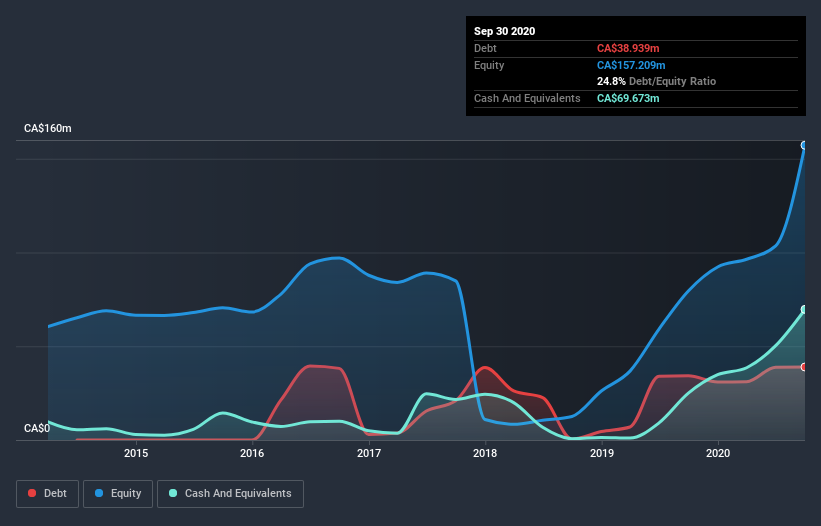The external fund manager backed by Berkshire Hathaway's Charlie Munger, Li Lu, makes no bones about it when he says 'The biggest investment risk is not the volatility of prices, but whether you will suffer a permanent loss of capital.' So it might be obvious that you need to consider debt, when you think about how risky any given stock is, because too much debt can sink a company. We can see that Karora Resources Inc. (TSE:KRR) does use debt in its business. But is this debt a concern to shareholders?
Why Does Debt Bring Risk?
Debt and other liabilities become risky for a business when it cannot easily fulfill those obligations, either with free cash flow or by raising capital at an attractive price. Ultimately, if the company can't fulfill its legal obligations to repay debt, shareholders could walk away with nothing. However, a more usual (but still expensive) situation is where a company must dilute shareholders at a cheap share price simply to get debt under control. By replacing dilution, though, debt can be an extremely good tool for businesses that need capital to invest in growth at high rates of return. The first step when considering a company's debt levels is to consider its cash and debt together.
View our latest analysis for Karora Resources
What Is Karora Resources's Net Debt?
The image below, which you can click on for greater detail, shows that at September 2020 Karora Resources had debt of CA$38.9m, up from CA$34.2m in one year. But it also has CA$69.7m in cash to offset that, meaning it has CA$30.7m net cash.

A Look At Karora Resources' Liabilities
Zooming in on the latest balance sheet data, we can see that Karora Resources had liabilities of CA$48.2m due within 12 months and liabilities of CA$110.5m due beyond that. On the other hand, it had cash of CA$69.7m and CA$2.94m worth of receivables due within a year. So it has liabilities totalling CA$86.0m more than its cash and near-term receivables, combined.
Of course, Karora Resources has a market capitalization of CA$466.6m, so these liabilities are probably manageable. Having said that, it's clear that we should continue to monitor its balance sheet, lest it change for the worse. Despite its noteworthy liabilities, Karora Resources boasts net cash, so it's fair to say it does not have a heavy debt load!
Even more impressive was the fact that Karora Resources grew its EBIT by 172% over twelve months. That boost will make it even easier to pay down debt going forward. The balance sheet is clearly the area to focus on when you are analysing debt. But it is future earnings, more than anything, that will determine Karora Resources's ability to maintain a healthy balance sheet going forward. So if you're focused on the future you can check out this free report showing analyst profit forecasts.
But our final consideration is also important, because a company cannot pay debt with paper profits; it needs cold hard cash. Karora Resources may have net cash on the balance sheet, but it is still interesting to look at how well the business converts its earnings before interest and tax (EBIT) to free cash flow, because that will influence both its need for, and its capacity to manage debt. During the last two years, Karora Resources burned a lot of cash. While that may be a result of expenditure for growth, it does make the debt far more risky.
Summing up
While Karora Resources does have more liabilities than liquid assets, it also has net cash of CA$30.7m. And it impressed us with its EBIT growth of 172% over the last year. So we are not troubled with Karora Resources's debt use. There's no doubt that we learn most about debt from the balance sheet. But ultimately, every company can contain risks that exist outside of the balance sheet. For instance, we've identified 4 warning signs for Karora Resources (1 is concerning) you should be aware of.
Of course, if you're the type of investor who prefers buying stocks without the burden of debt, then don't hesitate to discover our exclusive list of net cash growth stocks, today.
If you decide to trade Karora Resources, use the lowest-cost* platform that is rated #1 Overall by Barron’s, Interactive Brokers. Trade stocks, options, futures, forex, bonds and funds on 135 markets, all from a single integrated account. Promoted
Valuation is complex, but we're here to simplify it.
Discover if Karora Resources might be undervalued or overvalued with our detailed analysis, featuring fair value estimates, potential risks, dividends, insider trades, and its financial condition.
Access Free AnalysisThis article by Simply Wall St is general in nature. It does not constitute a recommendation to buy or sell any stock, and does not take account of your objectives, or your financial situation. We aim to bring you long-term focused analysis driven by fundamental data. Note that our analysis may not factor in the latest price-sensitive company announcements or qualitative material. Simply Wall St has no position in any stocks mentioned.
*Interactive Brokers Rated Lowest Cost Broker by StockBrokers.com Annual Online Review 2020
Have feedback on this article? Concerned about the content? Get in touch with us directly. Alternatively, email editorial-team (at) simplywallst.com.
About TSX:KRR
Karora Resources
Operates as a multi-asset mineral resource company in Australia.
Solid track record with excellent balance sheet.
Market Insights
Community Narratives



